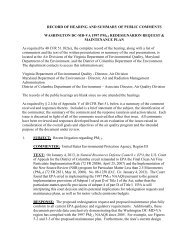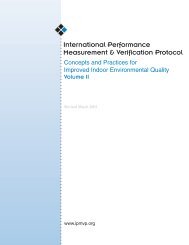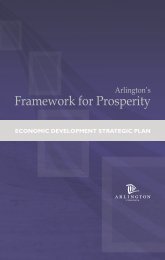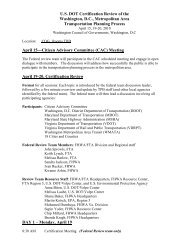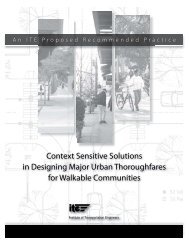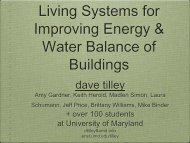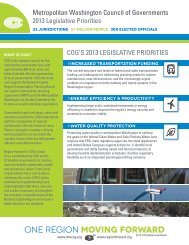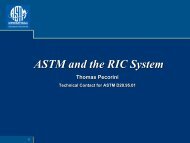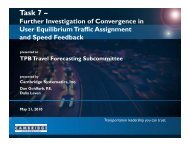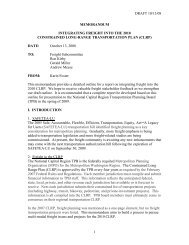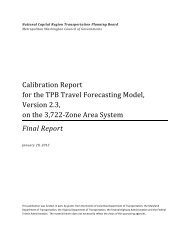PTI Local Government Energy Assurance Guidelines - Metropolitan ...
PTI Local Government Energy Assurance Guidelines - Metropolitan ...
PTI Local Government Energy Assurance Guidelines - Metropolitan ...
Create successful ePaper yourself
Turn your PDF publications into a flip-book with our unique Google optimized e-Paper software.
The sections below reference NASEO’s State <strong>Energy</strong> <strong>Assurance</strong> <strong>Guidelines</strong>, with an emphasis on organizing EAP<br />
information to make it most relevant to local governments. 36<br />
<strong>Local</strong> <strong>Government</strong> Contacts<br />
Finding the local government agency responsible for emergency management and/or implementation of the local<br />
emergency operations plan (EOP) is an excellent start to building a contact list. (The State EOP is the framework<br />
within which local EOPs are created, and through which the Federal government becomes involved in an<br />
emergency.) Emergency management personnel will often have valuable energy expertise to offer to the EAP efforts.<br />
Other potentially useful local government contacts include the following:<br />
■■<br />
■■<br />
■■<br />
■■<br />
■■<br />
■■<br />
■■<br />
■■<br />
Hazard mitigation planner/coordinator<br />
Public works agency (especially for water and wastewater issues—not just energy)<br />
<strong>Energy</strong> manager(s)<br />
Public Information Officer (PIO)<br />
Chief Financial Officer<br />
Heads of any centralized procurement agencies<br />
City/county legal counsel<br />
Utility manager (if the jurisdiction has its own municipal utility)<br />
Emergency managers and agency representatives from neighboring local governments are also valuable contacts,<br />
since planners will coordinate mutual aid, as needed, through these people. Be sure to include any relevant people<br />
from the local government who may work on or with <strong>Metropolitan</strong> Planning Organizations (MPOs) and regional<br />
Councils of <strong>Government</strong>s (COGs). They sometimes have valuable energy assurance expertise, or access to this<br />
much-valued expertise.<br />
State <strong>Government</strong> Contacts<br />
■ ■ Emergency Management Agency (EMA): The primary emergency response agency in most States is the<br />
State emergency management agency or similar authority. The State emergency management agency has<br />
important access to State emergency response resources, and it serves as a key link to Federal resources,<br />
making it a critical partner in energy assurance efforts.<br />
■ ■ State <strong>Energy</strong> Office (SEO): Most State <strong>Energy</strong> Offices (SEOs) were established during the early 1970s in<br />
response to the oil embargo. As a result, most SEOs are involved in monitoring petroleum supply issues.<br />
Since the late 1980s, many SEOs have been placed within other State agencies that may or may not have the<br />
responsibility for energy emergency management.<br />
■ ■ Public Service Commission/Public Utility Commission (PUC): PUCs are regulatory agencies which monitor<br />
regulated utilities and associated energy suppliers. States with non-regulated rural electric cooperatives and/<br />
or municipally-owned utilities may also develop reporting/monitoring requirements for such systems. Electric<br />
and gas utilities are generally required by PUCs to have up-to-date emergency response and power restoration<br />
plans. These plans may or may not have to be filed with a public authority but are almost universally required<br />
for licensing purposes. Most State emergency management agencies now incorporate utility and PUC<br />
responders in their emergency response frameworks.<br />
36<br />
http://www.naseo.org/eaguidelines/.<br />
<strong>Local</strong> <strong>Government</strong> <strong>Energy</strong> <strong>Assurance</strong> <strong>Guidelines</strong> – Version 2.0 | 53



